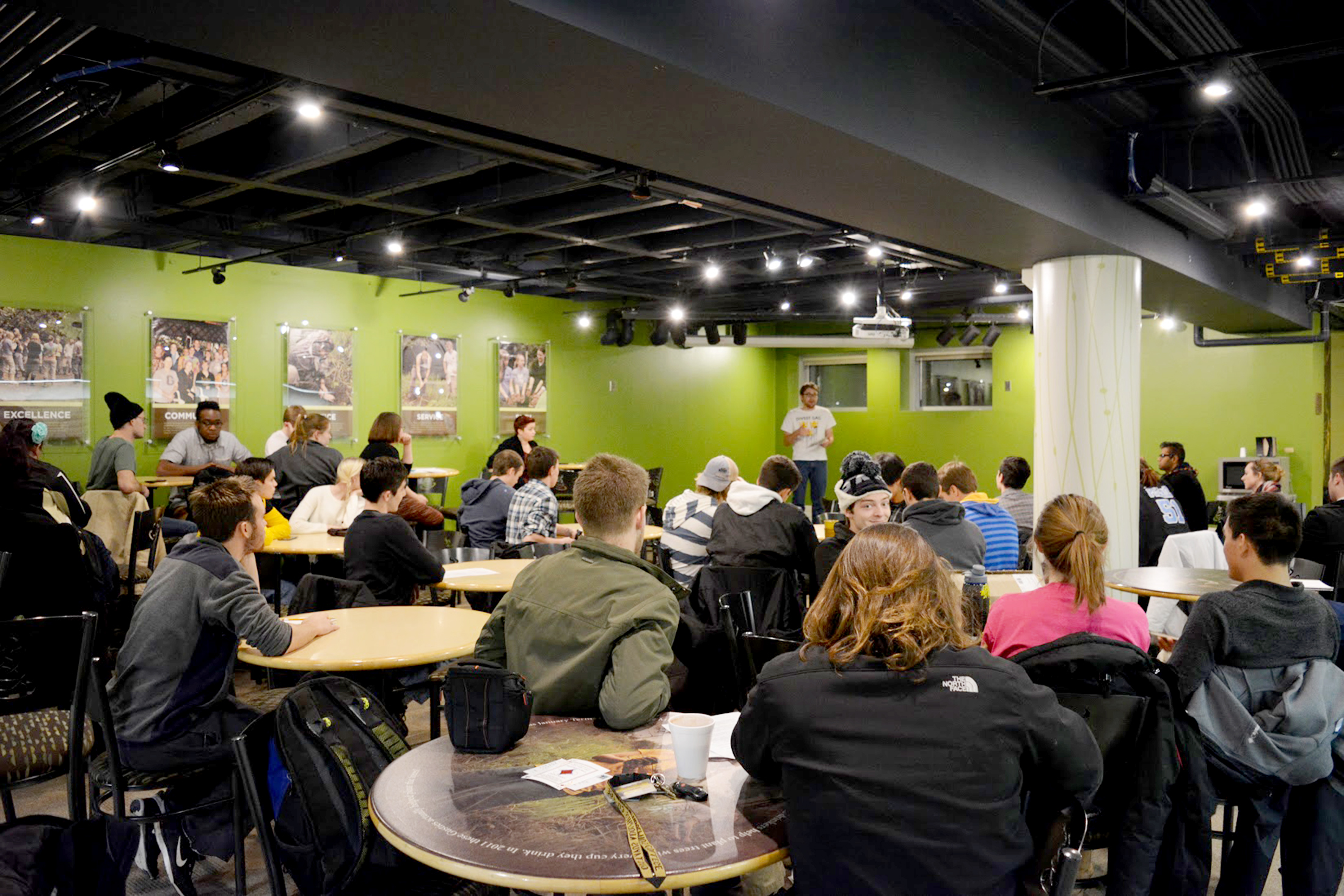The Forensics team hosted a lively and informed Student Presidential Debate on Jan. 19. The event was held in the Courtyard Cafe, from 7-9 pm. Students argued the case for Presidential candidates Hilary Clinton, Bernie Sanders, and Rand Paul. The debates, moderated by Emily Meyer of the Forensics Team, hit on a wide range of political topics.
The Forensics team is a public speaking and debate team that travels across the country on the weekends to speak competitively. The team engages in interpretation (similar to acting), public address (persausive speech) and debate. The group put on this event because they believe in the importance of being informed citizens.
“I think it is really important for students to be politically informed, so I wanted to gather the students together to gage how much they know about things, what they considered important points, see what they really wanted to discuss and then see where the spectrum of support lies among our students,” said Meyer, a Senior Biology major.
Meyer also believes the political debates need better moderators to reel in the candidates and keep the conversation focused on the subjects that matter to the citizens, rather than the subjects that cater to the ratings.
While the night was filled with debate, the one item that the room seemed to agree on was a disdain for Republican front runner Donald Trump.
According to a poll conducted by Monmouth University, Mr. Trump holds 36% of the Republican vote as of January 20. The businessman has shocked the country by taking a substantial lead over Texas Senator Ted Cruz (17%) and Florida Senator Marco Rubio (11%),. Mr. Paul, the Kentucky Senator is in ninth place, at 2%.
While both strong democratic candidates were represented, the majority of the Republican candidates were not represented in the debate. On the Democrat side, it is a two horse race between Ms. Clinton, the former Secretary of State and Vermont Senator Bernie Sanders.
As of Dec. 19th, Monmouth reports Ms. Clinton is leading Mr. Sanders, 52% to 37%, a gap that was much larger just months ago. In a general election, Mr. Sanders is favored over Mr. Trump by 15 points, and Ms. Clinton is favored over Mr. Trump by 2.5 points, according to NBC News and the Wall St. Journal.
The audience attending the event was primarily supporting Mr. Sanders, reflecting his support among young people. Mr. Paul had less support, but his supporters were strong debaters, and held their own against the room. Ms. Clinton’s few supporters were attacked throughout the night from both Mr. Sanders and Mr. Paul supporters. Ms. Clinton’s supporters held strong and continued to cite the fact that she was the most electable candidate.
“I am a realist, not an idealist,” Junior Andrew Hillis argued, who went on to cite Ms. Clinton’s strong resume and experience working with both parties.Freshman Andrew Deziel echoed the thesis of Mr. Sanders’ campaign, saying that he is the only candidate whose policies represent everybody in the United States, not only the interests of Wall Street.
“Bernie is the only candidate who is walking the walk, he does not have a Super PAC, his average donation is less than thirty dollars,” Deziel said.
Much like the Democratic debate last Sunday night, Ms. Clinton was challenged on the money she receives from large corporations, specifically Goldman Sachs, while Mr. Sanders was challenged on his experience and electability.
All three candidates represented agreed on some issues. Mr. Paul, a Libertarian, is unlike much of the Republican field in that he is against the wars in the Middle East, and against what some call the war on drugs, namely the mass incarceration of the lower class and minorities through minor drug possessions.
Mr. Paul’s camp included a representative from his campaign, who echoed Mr. Paul’s sentiments for a small government. Mr. Paul’s camp and Mr. Sander’s camp had a lengthy debate about whether health care should be public or private.
Mr. Paul’s supporters argued health care should be earned and that forcing it on any citizen would be unjust, while Mr. Sanders’ supporters argued that the United States should treat health care as a right, citing the rest of the developed world’s philosophy towards health care. While Mr. Paul’s camp argued for limiting government’s role in health care, and Mr. Sander’s camp argued for expanding it, Ms. Clinton would largely maintain Mr. Obama’s Affordable Care Act.
The campaign trail heats up as November looms closer without a clear front-runner for either party.
